#WBTC1 #EvoBeh2 For greaterhorseshoe  https://abs.twimg.com/emoji/v2/... draggable="false" alt="🦇" title="Bat" aria-label="Emoji: Bat">s, sociality follows an annual
https://abs.twimg.com/emoji/v2/... draggable="false" alt="🦇" title="Bat" aria-label="Emoji: Bat">s, sociality follows an annual  https://abs.twimg.com/emoji/v2/... draggable="false" alt="🔄" title="Anticlockwise downwards and upwards open circle arrows" aria-label="Emoji: Anticlockwise downwards and upwards open circle arrows"> in which ⚥ are largely segregated during the summer, before associating together during winter. Interestingly, only ~40% of
https://abs.twimg.com/emoji/v2/... draggable="false" alt="🔄" title="Anticlockwise downwards and upwards open circle arrows" aria-label="Emoji: Anticlockwise downwards and upwards open circle arrows"> in which ⚥ are largely segregated during the summer, before associating together during winter. Interestingly, only ~40% of  https://abs.twimg.com/emoji/v2/... draggable="false" alt="🦇" title="Bat" aria-label="Emoji: Bat">s form these winter “clusters” each year. Why are some
https://abs.twimg.com/emoji/v2/... draggable="false" alt="🦇" title="Bat" aria-label="Emoji: Bat">s form these winter “clusters” each year. Why are some  https://abs.twimg.com/emoji/v2/... draggable="false" alt="🦇" title="Bat" aria-label="Emoji: Bat">s social & others not?
https://abs.twimg.com/emoji/v2/... draggable="false" alt="🦇" title="Bat" aria-label="Emoji: Bat">s social & others not?
2) #WBTC1 #EvoBeh2 Over 4 years we studied a population of GHBs at 14 underground sites in Gloucestershire, UK. Morphometric measurements, age, and reproductive status were recorded for every  https://abs.twimg.com/emoji/v2/... draggable="false" alt="🦇" title="Bat" aria-label="Emoji: Bat">, in addition to whether the bat was alone or in a group.
https://abs.twimg.com/emoji/v2/... draggable="false" alt="🦇" title="Bat" aria-label="Emoji: Bat">, in addition to whether the bat was alone or in a group.
3) #WBTC1 #EvoBeh2 Clustering  https://abs.twimg.com/emoji/v2/... draggable="false" alt="🦇" title="Bat" aria-label="Emoji: Bat">s tended to be younger w/ lower energy reserves vs their solitary counterparts. Why might this be? 1 hypothesis is that grouping improves survival rates of juveniles. Juvs face a particularly high risk of starvation over winter…
https://abs.twimg.com/emoji/v2/... draggable="false" alt="🦇" title="Bat" aria-label="Emoji: Bat">s tended to be younger w/ lower energy reserves vs their solitary counterparts. Why might this be? 1 hypothesis is that grouping improves survival rates of juveniles. Juvs face a particularly high risk of starvation over winter…
4) #WBTC1 #EvoBeh2 with later born young being most disadvantaged. Mortality risk can be mitigated by synchronising arousal to suitable foraging conditions, through careful selection of a roosting position that matches ambient temp. and alignment of  https://abs.twimg.com/emoji/v2/... draggable="false" alt="⏰" title="Alarm clock" aria-label="Emoji: Alarm clock">s to dusk.
https://abs.twimg.com/emoji/v2/... draggable="false" alt="⏰" title="Alarm clock" aria-label="Emoji: Alarm clock">s to dusk.
5) #WBTC1 #EvoBeh2 Where do clusters come into this? Grouping may be an additional mechanism through which GHs can efficiently time their arousal. Perhaps arousal is even more effective having noisy neighbours to wake you up. Future work with thermal imaging seeks to test this.
A big thank you to all of the brilliant scientists  https://abs.twimg.com/emoji/v2/... draggable="false" alt="⬇️" title="Downwards arrow" aria-label="Emoji: Downwards arrow">. A lot of very interesting greater horseshoe bat research awaits - stay tuned!
https://abs.twimg.com/emoji/v2/... draggable="false" alt="⬇️" title="Downwards arrow" aria-label="Emoji: Downwards arrow">. A lot of very interesting greater horseshoe bat research awaits - stay tuned!

 Read on Twitter
Read on Twitter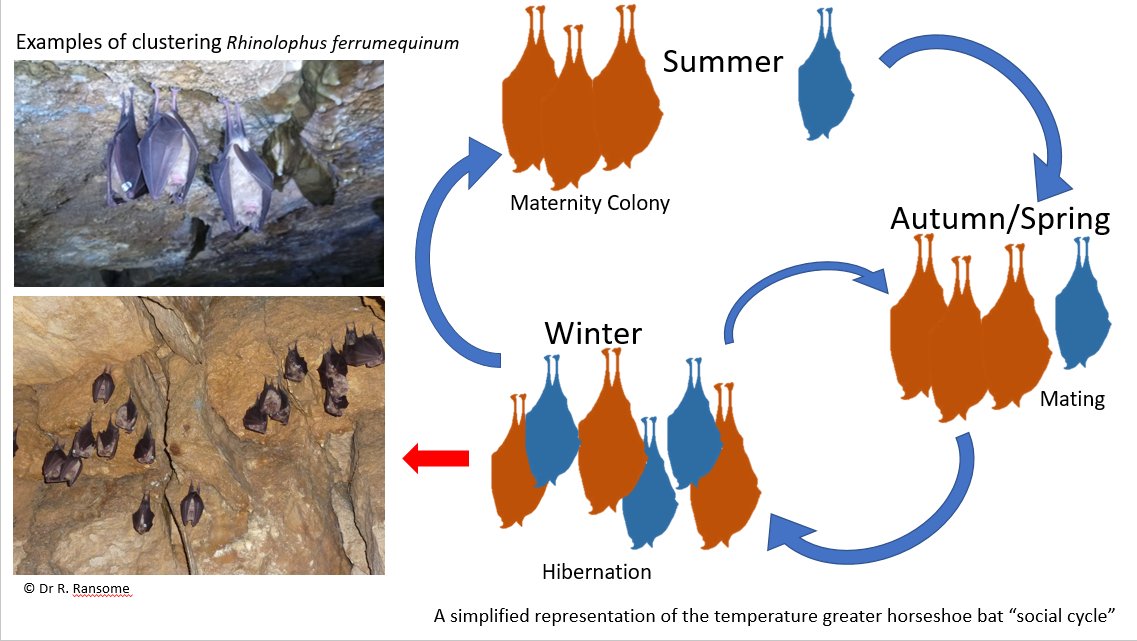 s, sociality follows an annual https://abs.twimg.com/emoji/v2/... draggable="false" alt="🔄" title="Anticlockwise downwards and upwards open circle arrows" aria-label="Emoji: Anticlockwise downwards and upwards open circle arrows"> in which ⚥ are largely segregated during the summer, before associating together during winter. Interestingly, only ~40% of https://abs.twimg.com/emoji/v2/... draggable="false" alt="🦇" title="Bat" aria-label="Emoji: Bat">s form these winter “clusters” each year. Why are some https://abs.twimg.com/emoji/v2/... draggable="false" alt="🦇" title="Bat" aria-label="Emoji: Bat">s social & others not?" title=" #WBTC1 #EvoBeh2 For greaterhorseshoe https://abs.twimg.com/emoji/v2/... draggable="false" alt="🦇" title="Bat" aria-label="Emoji: Bat">s, sociality follows an annual https://abs.twimg.com/emoji/v2/... draggable="false" alt="🔄" title="Anticlockwise downwards and upwards open circle arrows" aria-label="Emoji: Anticlockwise downwards and upwards open circle arrows"> in which ⚥ are largely segregated during the summer, before associating together during winter. Interestingly, only ~40% of https://abs.twimg.com/emoji/v2/... draggable="false" alt="🦇" title="Bat" aria-label="Emoji: Bat">s form these winter “clusters” each year. Why are some https://abs.twimg.com/emoji/v2/... draggable="false" alt="🦇" title="Bat" aria-label="Emoji: Bat">s social & others not?" class="img-responsive" style="max-width:100%;"/>
s, sociality follows an annual https://abs.twimg.com/emoji/v2/... draggable="false" alt="🔄" title="Anticlockwise downwards and upwards open circle arrows" aria-label="Emoji: Anticlockwise downwards and upwards open circle arrows"> in which ⚥ are largely segregated during the summer, before associating together during winter. Interestingly, only ~40% of https://abs.twimg.com/emoji/v2/... draggable="false" alt="🦇" title="Bat" aria-label="Emoji: Bat">s form these winter “clusters” each year. Why are some https://abs.twimg.com/emoji/v2/... draggable="false" alt="🦇" title="Bat" aria-label="Emoji: Bat">s social & others not?" title=" #WBTC1 #EvoBeh2 For greaterhorseshoe https://abs.twimg.com/emoji/v2/... draggable="false" alt="🦇" title="Bat" aria-label="Emoji: Bat">s, sociality follows an annual https://abs.twimg.com/emoji/v2/... draggable="false" alt="🔄" title="Anticlockwise downwards and upwards open circle arrows" aria-label="Emoji: Anticlockwise downwards and upwards open circle arrows"> in which ⚥ are largely segregated during the summer, before associating together during winter. Interestingly, only ~40% of https://abs.twimg.com/emoji/v2/... draggable="false" alt="🦇" title="Bat" aria-label="Emoji: Bat">s form these winter “clusters” each year. Why are some https://abs.twimg.com/emoji/v2/... draggable="false" alt="🦇" title="Bat" aria-label="Emoji: Bat">s social & others not?" class="img-responsive" style="max-width:100%;"/>
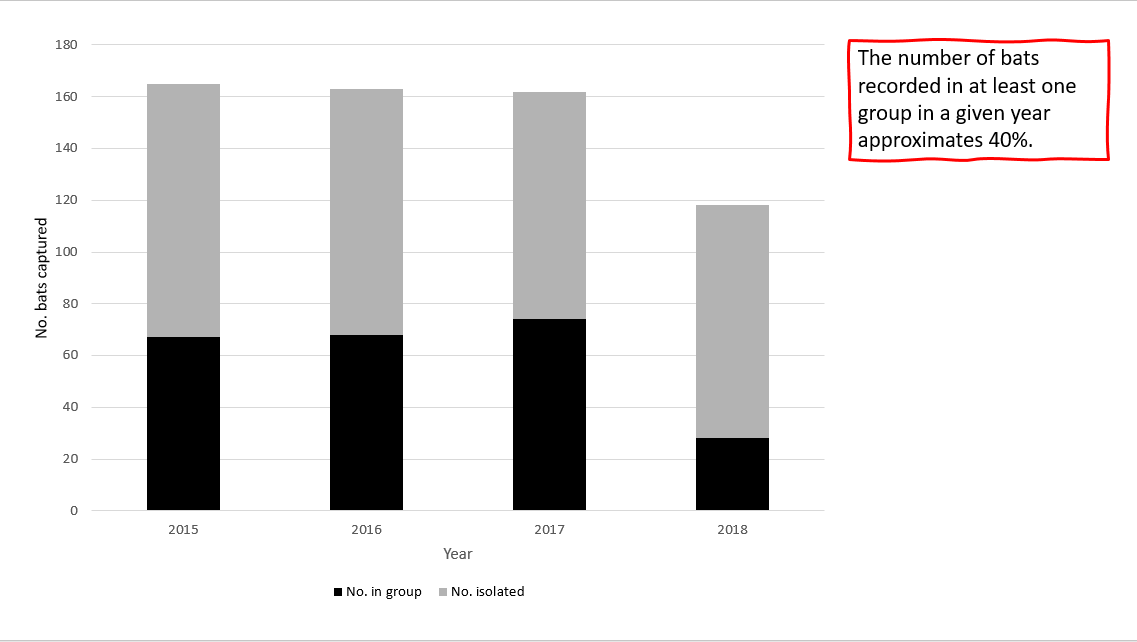 s, sociality follows an annual https://abs.twimg.com/emoji/v2/... draggable="false" alt="🔄" title="Anticlockwise downwards and upwards open circle arrows" aria-label="Emoji: Anticlockwise downwards and upwards open circle arrows"> in which ⚥ are largely segregated during the summer, before associating together during winter. Interestingly, only ~40% of https://abs.twimg.com/emoji/v2/... draggable="false" alt="🦇" title="Bat" aria-label="Emoji: Bat">s form these winter “clusters” each year. Why are some https://abs.twimg.com/emoji/v2/... draggable="false" alt="🦇" title="Bat" aria-label="Emoji: Bat">s social & others not?" title=" #WBTC1 #EvoBeh2 For greaterhorseshoe https://abs.twimg.com/emoji/v2/... draggable="false" alt="🦇" title="Bat" aria-label="Emoji: Bat">s, sociality follows an annual https://abs.twimg.com/emoji/v2/... draggable="false" alt="🔄" title="Anticlockwise downwards and upwards open circle arrows" aria-label="Emoji: Anticlockwise downwards and upwards open circle arrows"> in which ⚥ are largely segregated during the summer, before associating together during winter. Interestingly, only ~40% of https://abs.twimg.com/emoji/v2/... draggable="false" alt="🦇" title="Bat" aria-label="Emoji: Bat">s form these winter “clusters” each year. Why are some https://abs.twimg.com/emoji/v2/... draggable="false" alt="🦇" title="Bat" aria-label="Emoji: Bat">s social & others not?" class="img-responsive" style="max-width:100%;"/>
s, sociality follows an annual https://abs.twimg.com/emoji/v2/... draggable="false" alt="🔄" title="Anticlockwise downwards and upwards open circle arrows" aria-label="Emoji: Anticlockwise downwards and upwards open circle arrows"> in which ⚥ are largely segregated during the summer, before associating together during winter. Interestingly, only ~40% of https://abs.twimg.com/emoji/v2/... draggable="false" alt="🦇" title="Bat" aria-label="Emoji: Bat">s form these winter “clusters” each year. Why are some https://abs.twimg.com/emoji/v2/... draggable="false" alt="🦇" title="Bat" aria-label="Emoji: Bat">s social & others not?" title=" #WBTC1 #EvoBeh2 For greaterhorseshoe https://abs.twimg.com/emoji/v2/... draggable="false" alt="🦇" title="Bat" aria-label="Emoji: Bat">s, sociality follows an annual https://abs.twimg.com/emoji/v2/... draggable="false" alt="🔄" title="Anticlockwise downwards and upwards open circle arrows" aria-label="Emoji: Anticlockwise downwards and upwards open circle arrows"> in which ⚥ are largely segregated during the summer, before associating together during winter. Interestingly, only ~40% of https://abs.twimg.com/emoji/v2/... draggable="false" alt="🦇" title="Bat" aria-label="Emoji: Bat">s form these winter “clusters” each year. Why are some https://abs.twimg.com/emoji/v2/... draggable="false" alt="🦇" title="Bat" aria-label="Emoji: Bat">s social & others not?" class="img-responsive" style="max-width:100%;"/>
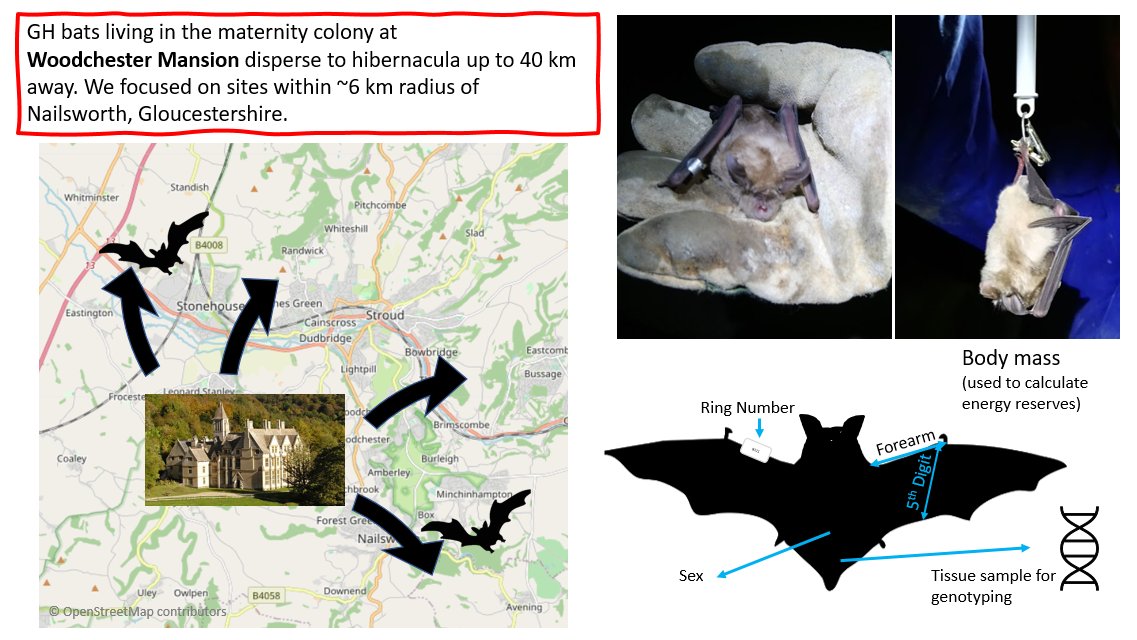 , in addition to whether the bat was alone or in a group." title="2) #WBTC1 #EvoBeh2 Over 4 years we studied a population of GHBs at 14 underground sites in Gloucestershire, UK. Morphometric measurements, age, and reproductive status were recorded for every https://abs.twimg.com/emoji/v2/... draggable="false" alt="🦇" title="Bat" aria-label="Emoji: Bat">, in addition to whether the bat was alone or in a group." class="img-responsive" style="max-width:100%;"/>
, in addition to whether the bat was alone or in a group." title="2) #WBTC1 #EvoBeh2 Over 4 years we studied a population of GHBs at 14 underground sites in Gloucestershire, UK. Morphometric measurements, age, and reproductive status were recorded for every https://abs.twimg.com/emoji/v2/... draggable="false" alt="🦇" title="Bat" aria-label="Emoji: Bat">, in addition to whether the bat was alone or in a group." class="img-responsive" style="max-width:100%;"/>
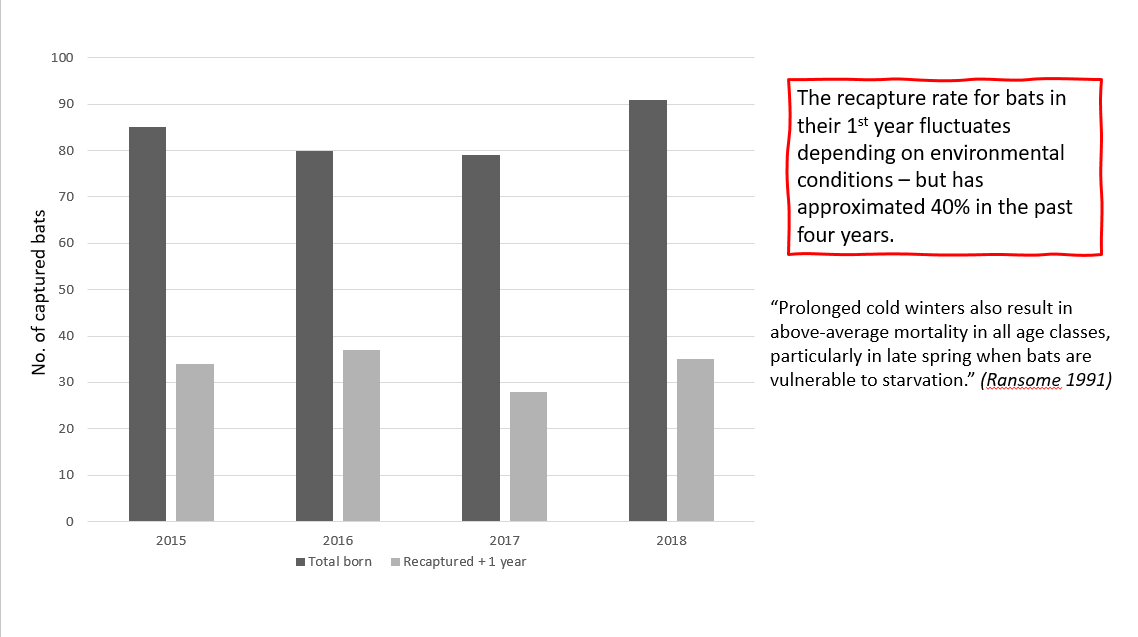 s tended to be younger w/ lower energy reserves vs their solitary counterparts. Why might this be? 1 hypothesis is that grouping improves survival rates of juveniles. Juvs face a particularly high risk of starvation over winter…" title="3) #WBTC1 #EvoBeh2 Clustering https://abs.twimg.com/emoji/v2/... draggable="false" alt="🦇" title="Bat" aria-label="Emoji: Bat">s tended to be younger w/ lower energy reserves vs their solitary counterparts. Why might this be? 1 hypothesis is that grouping improves survival rates of juveniles. Juvs face a particularly high risk of starvation over winter…">
s tended to be younger w/ lower energy reserves vs their solitary counterparts. Why might this be? 1 hypothesis is that grouping improves survival rates of juveniles. Juvs face a particularly high risk of starvation over winter…" title="3) #WBTC1 #EvoBeh2 Clustering https://abs.twimg.com/emoji/v2/... draggable="false" alt="🦇" title="Bat" aria-label="Emoji: Bat">s tended to be younger w/ lower energy reserves vs their solitary counterparts. Why might this be? 1 hypothesis is that grouping improves survival rates of juveniles. Juvs face a particularly high risk of starvation over winter…">
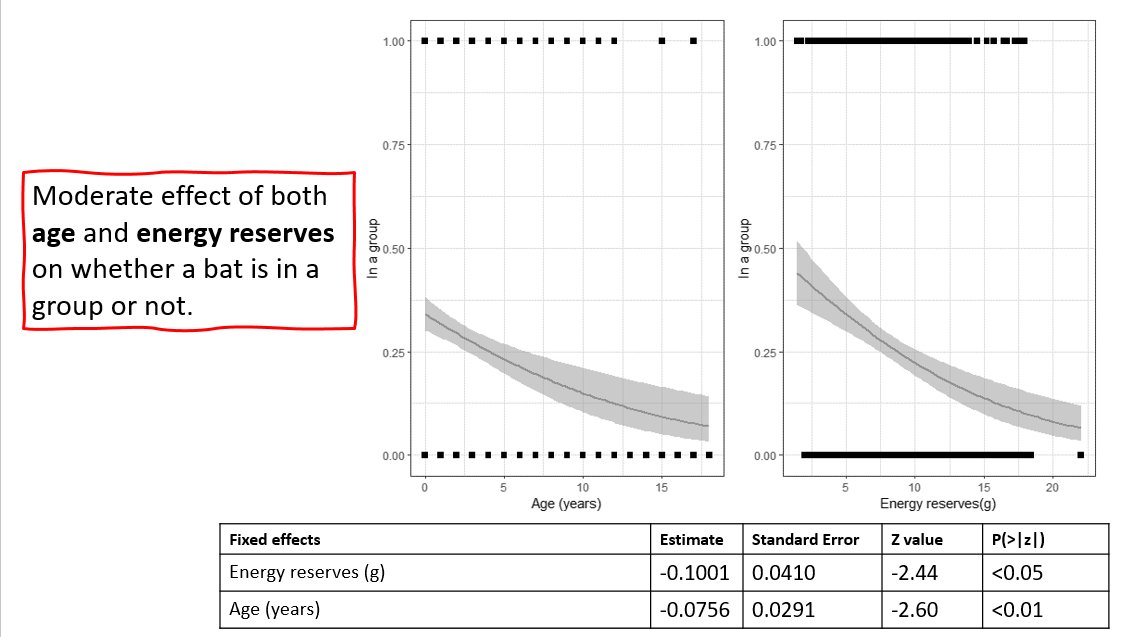 s tended to be younger w/ lower energy reserves vs their solitary counterparts. Why might this be? 1 hypothesis is that grouping improves survival rates of juveniles. Juvs face a particularly high risk of starvation over winter…" title="3) #WBTC1 #EvoBeh2 Clustering https://abs.twimg.com/emoji/v2/... draggable="false" alt="🦇" title="Bat" aria-label="Emoji: Bat">s tended to be younger w/ lower energy reserves vs their solitary counterparts. Why might this be? 1 hypothesis is that grouping improves survival rates of juveniles. Juvs face a particularly high risk of starvation over winter…">
s tended to be younger w/ lower energy reserves vs their solitary counterparts. Why might this be? 1 hypothesis is that grouping improves survival rates of juveniles. Juvs face a particularly high risk of starvation over winter…" title="3) #WBTC1 #EvoBeh2 Clustering https://abs.twimg.com/emoji/v2/... draggable="false" alt="🦇" title="Bat" aria-label="Emoji: Bat">s tended to be younger w/ lower energy reserves vs their solitary counterparts. Why might this be? 1 hypothesis is that grouping improves survival rates of juveniles. Juvs face a particularly high risk of starvation over winter…">
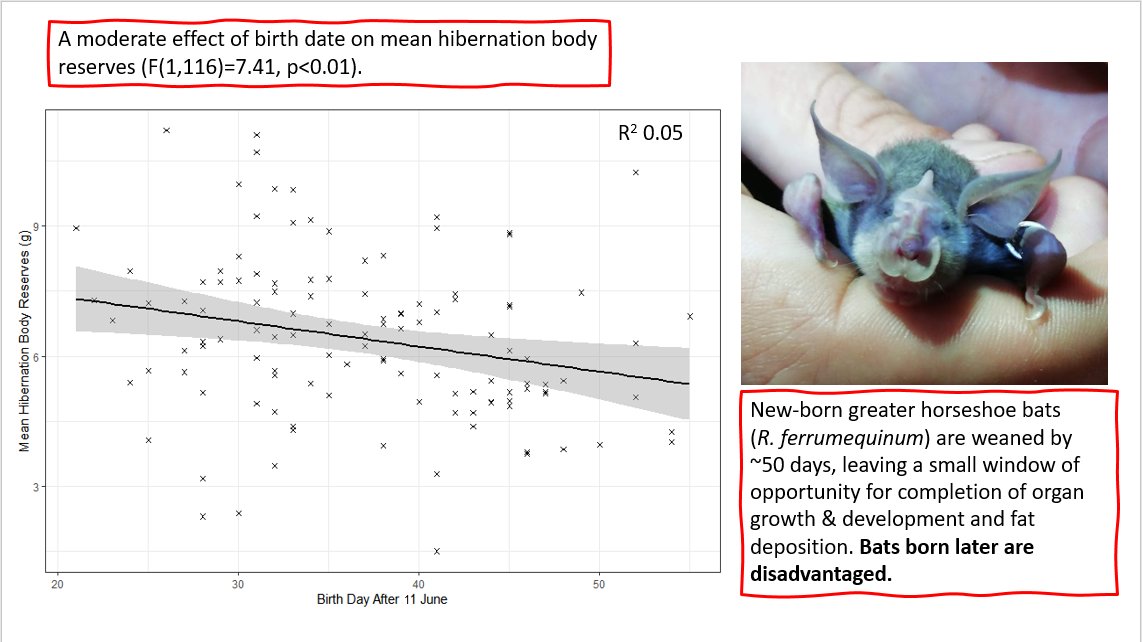 s to dusk." title="4) #WBTC1 #EvoBeh2 with later born young being most disadvantaged. Mortality risk can be mitigated by synchronising arousal to suitable foraging conditions, through careful selection of a roosting position that matches ambient temp. and alignment of https://abs.twimg.com/emoji/v2/... draggable="false" alt="⏰" title="Alarm clock" aria-label="Emoji: Alarm clock">s to dusk." class="img-responsive" style="max-width:100%;"/>
s to dusk." title="4) #WBTC1 #EvoBeh2 with later born young being most disadvantaged. Mortality risk can be mitigated by synchronising arousal to suitable foraging conditions, through careful selection of a roosting position that matches ambient temp. and alignment of https://abs.twimg.com/emoji/v2/... draggable="false" alt="⏰" title="Alarm clock" aria-label="Emoji: Alarm clock">s to dusk." class="img-responsive" style="max-width:100%;"/>
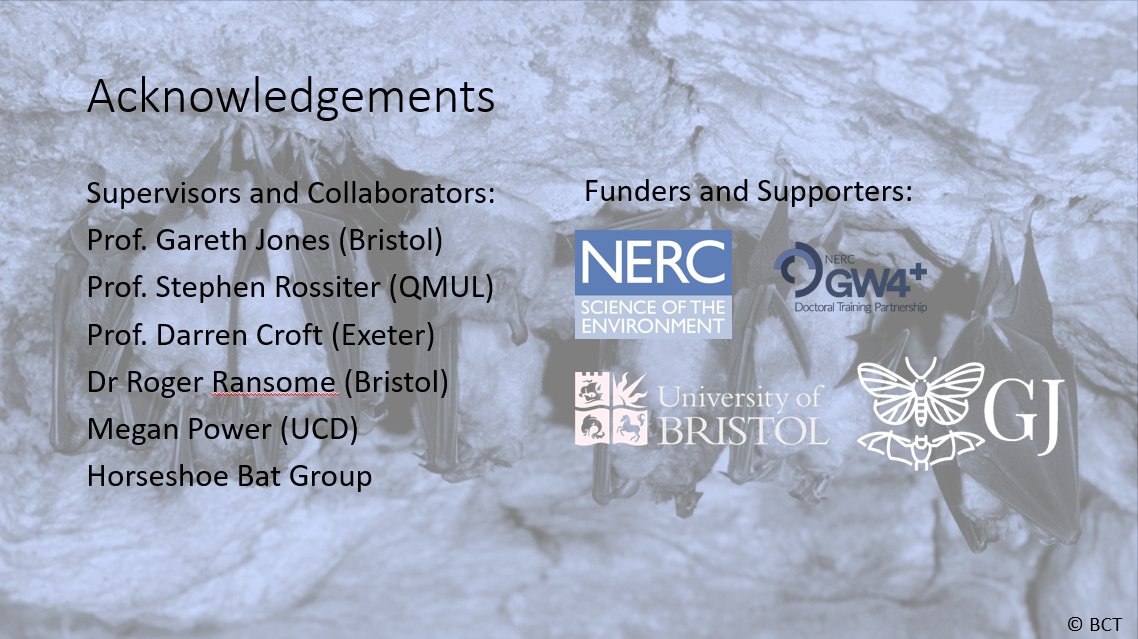 . A lot of very interesting greater horseshoe bat research awaits - stay tuned!" title="A big thank you to all of the brilliant scientists https://abs.twimg.com/emoji/v2/... draggable="false" alt="⬇️" title="Downwards arrow" aria-label="Emoji: Downwards arrow">. A lot of very interesting greater horseshoe bat research awaits - stay tuned!" class="img-responsive" style="max-width:100%;"/>
. A lot of very interesting greater horseshoe bat research awaits - stay tuned!" title="A big thank you to all of the brilliant scientists https://abs.twimg.com/emoji/v2/... draggable="false" alt="⬇️" title="Downwards arrow" aria-label="Emoji: Downwards arrow">. A lot of very interesting greater horseshoe bat research awaits - stay tuned!" class="img-responsive" style="max-width:100%;"/>


